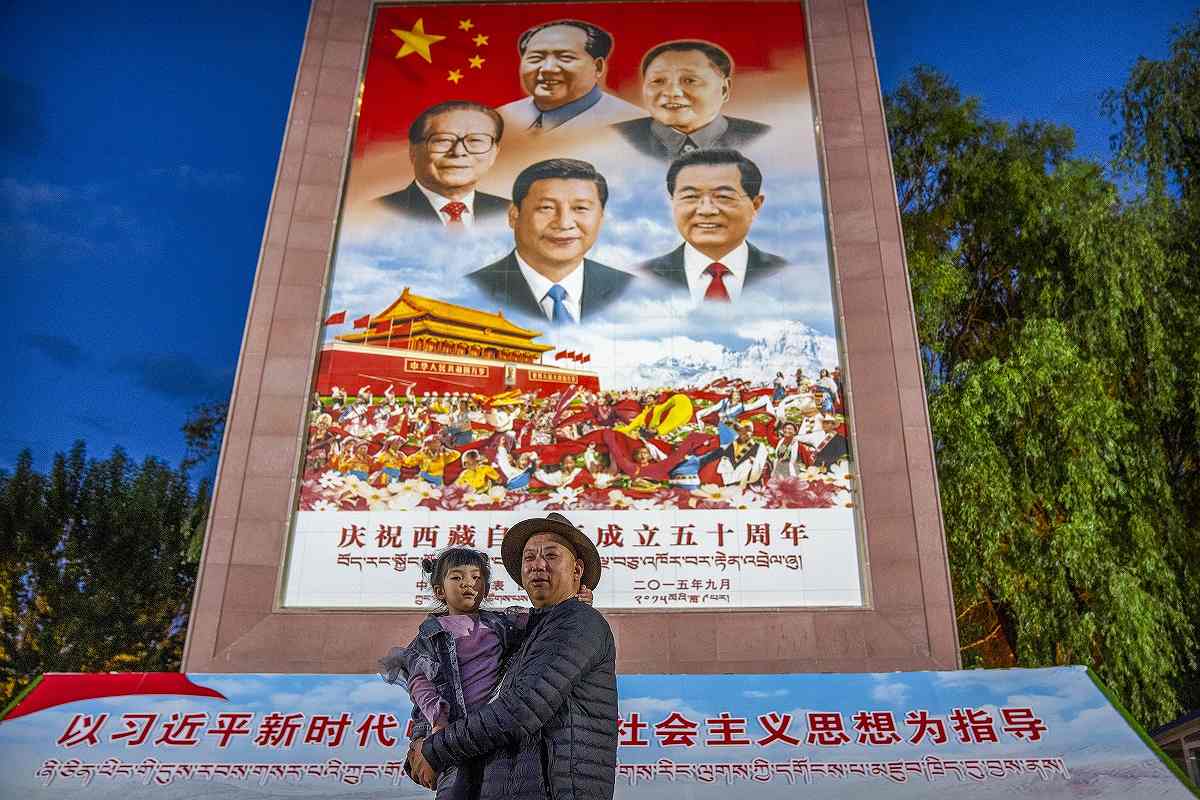
A man holds a girl as they pose for a photo in front of a large mural depicting Chinese President Xi Jinping, bottom center, and other Chinese leaders at a public square in Lhasa in western China’s Tibet Autonomous Region on June 1, 2021.
11:57 JST, June 1, 2024
TAIPEI (AP) — China is accelerating the forced urbanization of Tibetan villagers and herders, Human Rights Watch said, in an extensive report that adds to state government and independent reports of efforts to assimilate rural Tibetans through control over their language and traditional Buddhist culture.
The international rights organization cited a trove of Chinese internal reports contradicting official pronouncements that all Tibetans who have been forced to move, with their past homes destroyed on departure, did so voluntary.
The relocations fit a pattern of often-violent demands that ethnic minorities adopt the state language of Mandarin and pledge their fealty to the ruling Communist Party in western and northern territories that include millions of people from Tibetan, Xinjiang Uyghur, Mongolian and other minority groups.
China claims Tibet has been part of its territory for centuries, although it only established firm control over the Himalayan region after the Communist Party swept to power during a civil war in 1949.
“These coercive tactics can be traced to pressure placed on local officials by higher-level authorities who routinely characterize the relocation program as a non-negotiable, politically critical policy coming straight from the national capital, Beijing, or from Lhasa, the regional capital,” HRW said in the report. “This leaves local officials no flexibility in implementation at the local level and requires them to obtain 100% agreement from affected villagers to relocate.”
The report said official statistics suggest that by the end of 2025, more than 930,000 rural Tibetans will have been relocated to urban centers where they are deprived of their traditional sources of income and have difficulty finding work. Lhasa and other large towns have drawn large numbers of migrants from China’s dominant Han ethnic group, who dominate politics and the economy.
More than 3 million of the more than 4.5 million Tibetans in rural areas have been forced to build homes and give up their traditional nomadic lifestyles based on yak herding and agriculture, the report said. Along with the official Tibetan Autonomous Region, Tibetans make up communities in the neighboring provinces of Sichuan, Yunnan and Qinghai.
“These relocations of rural communities erode or cause major damage to Tibetan culture and ways of life, not least because most relocation programs in Tibet move former farmers and pastoralists to areas where they cannot practice their former livelihood and have no choice but to seek work as wage laborers in off-farm industries,” HRW said.
China has consistently defended its policies in Tibet as bringing stability and development to a strategically important border region. The region last had anti-government protests in 2008, leading to a massive military crackdown. Foreigners must apply for special permission to visit and journalists are largely barred, apart from those working for Chinese state media outlets.
China consistently says allegations of human rights abuses in Tibetan regions are groundless accusations intended to smear China’s image. Last August, Foreign Ministry spokesperson Wang Wenbin said human rights conditions in Tibet were “at their historical best.”
“The region has long enjoyed a booming economy, a harmonious and stable society, and effective protection and promotion of cultural heritage,” Wang said at the time. “The rights and freedoms of all ethnic groups, including the freedom of religious belief and the freedom to use and develop their ethnic groups of spoken and written languages are fully guaranteed.”
China, with its population of 1.4 billion people, claims to have eradicated extreme poverty, largely through moving isolated homes and tiny villages into larger communities with better access to transport, electricity, healthcare and education. Those claims have not been independently verified.
China’s economic growth has slowed considerably amid a population that is aging and a youth unemployment rate that has spiked, even as Chinese industries such as EV cars and mobile phones build their market shares overseas.
HRW recommended the U.N. Human Rights Council undertake an independent investigation into human rights violations committed by the Chinese government in Tibet and other areas.
Top Articles in World
-

China Confirmed to Be Operating Drilling Vessel Near Japan-China Median Line
-

China Eyes Rare Earth Foothold in Malaysia to Maintain Dominance, Counter Japan, U.S.
-

Japan, Qatar Ministers Agree on Need for Stable Energy Supplies; Motegi, Qatari Prime Minister Al-Thani Affirm Commitment to Cooperation
-

North Korea Possibly Launches Ballistic Missile
-

10 Universities in Japan, South Korea, Mongolia to Establish Academic Community to Promote ICC Activities, Rule of Law
JN ACCESS RANKING
-

Univ. in Japan, Tokyo-Based Startup to Develop Satellite for Disaster Prevention Measures, Bears
-

JAL, ANA Cancel Flights During 3-day Holiday Weekend due to Blizzard
-

China Confirmed to Be Operating Drilling Vessel Near Japan-China Median Line
-

China Eyes Rare Earth Foothold in Malaysia to Maintain Dominance, Counter Japan, U.S.
-

Japan Institute to Use Domestic Commercial Optical Lattice Clock to Set Japan Standard Time





















